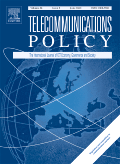
TELECOMMUNICATIONS POLICY
Scope & Guideline
Exploring the Intersection of Technology and Policy
Introduction
Aims and Scopes
- Policy Analysis and Development:
The journal emphasizes the analysis and development of telecommunications policies, examining how regulatory frameworks affect the telecommunications sector and its users. - Digital Divide and Inclusion:
A consistent focus on the digital divide, exploring issues of access, equity, and inclusion in telecommunications, particularly in rural and underserved areas. - Impact of Technology on Society:
Investigating the societal implications of new technologies such as 5G, blockchain, and IoT, and their effects on economic growth, job creation, and social dynamics. - Economic Analysis of Telecommunications:
Utilizing economic theories and empirical evidence to analyze the economic impacts of telecommunications, including market structures, competition, and consumer behavior. - Global Perspectives on Telecommunications:
Incorporating diverse global perspectives, particularly from developing regions, to understand the unique challenges and opportunities in telecommunications policy. - Sustainability and Telecommunications:
Exploring the relationship between telecommunications and sustainability, including environmental impacts and the role of digital technologies in promoting sustainable practices.
Trending and Emerging
- Impact of 5G and Future Technologies:
There is a growing emphasis on the implications of 5G technology and beyond, exploring its economic, social, and regulatory impacts, as well as its role in enabling new applications. - Blockchain and Digital Transformation:
Research focusing on blockchain technology's role in telecommunications and its potential to transform business models and regulatory practices is gaining traction. - Data Privacy and Protection:
With increasing concerns over data privacy, studies examining the implications of data protection laws and consumer attitudes towards privacy are becoming more prominent. - Digital Economy and Inclusivity:
The exploration of the digital economy's role in promoting inclusivity and addressing issues such as income inequality and access disparities is an emerging focal point. - Climate Impact and Sustainability:
Research on the environmental implications of telecommunications, particularly regarding energy consumption and carbon emissions, is increasingly relevant in the context of global sustainability efforts. - AI and Governance:
The intersection of artificial intelligence and telecommunications governance is becoming a significant theme, particularly in relation to ethical considerations and regulatory frameworks.
Declining or Waning
- Traditional Telecommunication Regulation:
There appears to be a declining focus on traditional forms of telecommunication regulation, as newer technologies and market dynamics shift the conversation towards more innovative regulatory approaches. - Simple Infrastructure Deployment:
Research specifically centered on basic infrastructure deployment is becoming less frequent, with a shift towards examining complex interactions between technology, policy, and socio-economic factors. - Single Country Case Studies:
There is a noticeable decrease in single-country case studies, as more comparative and global analyses are favored to capture broader trends and implications. - Basic Consumer Behavior Studies:
Studies focusing solely on basic consumer behavior are waning as the field moves towards more complex analyses that incorporate socio-economic variables and technological impacts. - Conventional Economic Models:
The reliance on traditional economic models without integration of technological advancements and consumer behavior is declining, reflecting a need for more nuanced frameworks.
Similar Journals

Annals of Telecommunications
Empowering researchers to shape the future of communication.Annals of Telecommunications is a prestigious peer-reviewed journal published by SPRINGER INT PUBL AG, dedicated to advancing the field of electrical and electronic engineering. Established in 1946, this journal presents a comprehensive collection of research articles that address the latest trends and developments in telecommunications, including innovative technologies, systems, and applications. With an impressive Q2 ranking in the 2023 category of Electrical and Electronic Engineering and a Scopus rank in the 68th percentile, the journal serves as a vital platform for researchers, professionals, and students looking to disseminate groundbreaking findings and engage with contemporary challenges in the field. Although it is not an Open Access journal, it offers a wealth of knowledge that contributes to both academic and practical advancements in telecommunications. The Annals of Telecommunications remains an essential resource for anyone involved in telecommunication research and practice, fostering collaboration and knowledge exchange globally.

Cimexus
Unearthing the Complexities of Our PastCimexus is a distinguished academic journal published by the Instituto de Investigaciones Históricas at Universidad Michoacana de San Nicolás de Hidalgo, focusing on the rich field of historical and cultural studies. With the ISSN 1870-6479 and E-ISSN 2007-9206, Cimexus has been an Open Access publication since 2006, promoting unrestricted dissemination of research to enhance collaboration and innovation. Situated in Morelia, Michoacán, Mexico, this journal serves as a vital platform for scholars and researchers dedicated to exploring the complexities of history and culture, thereby making significant contributions to the academic community. Through rigorous peer review and a commitment to high-quality research, Cimexus seeks to foster impactful discourse and provide visibility to pioneering studies in historical inquiry, encouraging engagement among professionals, researchers, and students alike.
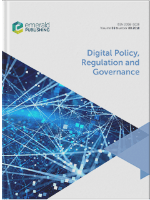
Digital Policy Regulation and Governance
Navigating the Future of Digital GovernanceDigital Policy Regulation and Governance, published by Emerald Group Publishing Ltd, is a leading academic journal dedicated to the fast-evolving fields of digital policy, regulatory frameworks, and governance practices in the digital age. With an ISSN of 2398-5038 and E-ISSN 2398-5046, this journal has been instrumental since its inception in 2017, paving the way for critical discussions surrounding the intersection of technology, policy, and societal governance, particularly in the context of rapid digital transformation. The journal is recognized in the Q2 category across several disciplines, including Computer Networks and Communications, Information Systems, and Management Information Systems, reflecting its relevance and quality within the academic community. With notable Scopus rankings placing it among the top tiers in multiple areas, Digital Policy Regulation and Governance serves as an essential resource for researchers, professionals, and students looking to navigate and shape the future of digital governance. While it currently does not offer open access options, its commitment to enriching the academic dialogue on digital policies and regulation remains steadfast, stimulating innovation and thought leadership in this critical field.

Netnomics
Decoding the Future of Digital Goods and ServicesNetnomics, published by SPRINGER, is a pivotal academic journal focusing on the intersection of economics, computer networks, and information systems. With its ISSN 1385-9587 and E-ISSN 1573-7071, this journal strives to address current trends and research challenges in the digital economy, effectively capturing the dynamics of online markets and digital goods. Although open access options are not available, Netnomics maintains an impressive standing, ranking in the Q3 category for its fields in Computer Networks and Communications, Economics and Econometrics, and Information Systems. Despite its discontinuation of coverage in Scopus from 2005 through 2021, the journal continues to contribute valuable insights, making it a relevant source for researchers, professionals, and students eager to explore the evolving landscape of economic interactions in a digitalized world. With a focus on empirical research and theoretical analysis, Netnomics provides a platform for advancing knowledge at the confluence of technology and economic theory, critical for professionals navigating the complexities of today's economy.

OPTICAL FIBER TECHNOLOGY
Advancing the Frontiers of Optical Fiber ResearchOPTICAL FIBER TECHNOLOGY is a premier journal in the fields of atomic and molecular physics, optics, control and systems engineering, as well as electrical and electronic engineering, published by ELSEVIER SCIENCE INC. With an ISSN of 1068-5200 and E-ISSN 1095-9912, it offers a platform for disseminating cutting-edge research and developments in optical fiber technology and its applications. The journal has achieved a notable impact, ranking in the second quartile for multiple categories in 2023, including control and systems engineering and electronic, optical, and magnetic materials. By providing a robust avenue for peer-reviewed articles, OPTICAL FIBER TECHNOLOGY caters to a diverse audience of researchers, professionals, and students dedicated to advancing knowledge and innovation in optics and related fields. This respected journal is particularly suited for those seeking to stay updated on the latest technological advancements and research trends, ensuring its relevance in both academic and industrial contexts.
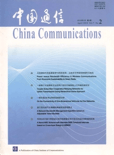
China Communications
Connecting Scholars to the Future of Information TechnologyChina Communications is a prestigious peer-reviewed journal published by the China Institute of Communications, dedicated to advancing the field of telecommunications and information technology. With an impressive Q1 ranking in both Computer Networks and Communications and Electrical and Electronic Engineering, this journal stands out as a leading source of cutting-edge research and innovative solutions in the engineering domain. The journal aims to provide a platform for scholars and practitioners to share their findings on the latest trends, technologies, and methodologies impacting the communications landscape in China and beyond. It is particularly noted for its high visibility in the academic community, as demonstrated by its Scopus rankings, which place it in the top percentiles for both fields. Through its commitment to quality content, China Communications contributes significantly to the advancement of knowledge, making it an invaluable resource for researchers, professionals, and students alike.
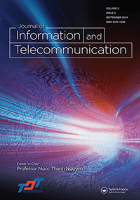
Journal of Information and Telecommunication
Exploring Innovations in Information Technology and Telecommunications.Journal of Information and Telecommunication, published by TAYLOR & FRANCIS LTD, is a distinguished open access journal that has been enhancing the global discourse since its establishment in 2017. With an ISSN of 2475-1839 and an E-ISSN of 2475-1847, this journal is located in the United Kingdom and dedicates its focus to the fields of information technology, telecommunications, and related disciplines. Boasting a respectable Q2 quartile ranking across various categories including Computer Networks and Communications, Electrical and Electronic Engineering, and Computer Science Applications in 2023, it ranks notably in the top percentiles of scopus rankings, asserting its significance in the academic community. The journal's commitment to open access since its inception has fostered widespread accessibility, encouraging research dissemination and collaboration on a global scale. By providing a platform for high-quality research, it aims to unite researchers, professionals, and students in their pursuit of innovation and excellence in the ever-evolving digital landscape.

Eria-Revista cuatrimestral de Geografia
Navigating the Complexities of Global Geography.Eria-Revista cuatrimestral de Geografia is a distinguished quarterly journal dedicated to advancing the field of geography, published by the esteemed University of Oviedo in Spain. With the ISSN 0211-0563, this journal serves as a vital platform for researchers, professionals, and students committed to exploring geographical themes and issues on a global scale. Although currently not open access, Eria aims to contribute to the rich tapestry of geographic knowledge, emphasizing interdisciplinary approaches and innovative research methodologies. By focusing on significant contemporary topics and fostering collaboration among scholars, the journal plays a pivotal role in shaping the future of geographic research and education. It is an essential resource for those seeking to engage with the latest findings and theoretical developments in geography.
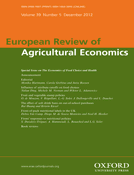
EUROPEAN REVIEW OF AGRICULTURAL ECONOMICS
Elevating the discourse on agricultural economics for global impact.European Review of Agricultural Economics, published by Oxford University Press, stands as a leading peer-reviewed journal that spans the intersection of economics and agricultural sciences. With a reputable Q1 ranking in both Agricultural and Biological Sciences and Economics and Econometrics as of 2023, this journal is committed to advancing knowledge in its field. The journal invites rigorous research and innovative insights that address pressing issues in agricultural economics, contributing to policy-making and the enhancement of economic practices globally. With a Scopus rank that places it in the top tier of its categories, researchers and professionals alike benefit from its high-impact content. The European Review of Agricultural Economics features a unique convergence of scholarly expertise, making it an essential resource for academics, industry practitioners, and students keen to explore the dynamics of agricultural economics in a rapidly changing world.
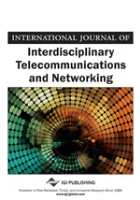
International Journal of Interdisciplinary Telecommunications and Networking
Unifying Knowledge, Shaping Tomorrow's NetworksThe International Journal of Interdisciplinary Telecommunications and Networking, published by IGI Global, serves as a pivotal resource for researchers, professionals, and students in the fields of telecommunications and networking. With an ISSN of 1941-8663 and an E-ISSN of 1941-8671, this journal aims to bridge the gap between various disciplines, presenting cutting-edge research and innovative solutions that address contemporary challenges in these rapidly evolving fields. Although currently not indexed for Open Access, the journal seeks to foster an inclusive platform for interdisciplinary dialogue, encouraging contributions that explore the intersections of technology, policy, and practice. As a dynamic publication, it aspires to enhance the understanding of telecommunication systems and their impact on society, making it an essential addition to the library of any scholar or practitioner looking to stay at the forefront of technological advancements.